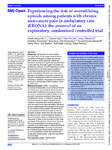2020-09-06Zeitschriftenartikel
Experiencing the risk of overutilising opioids among patients with chronic non-cancer pain in ambulatory care (ERONA): the protocol of an exploratory, randomised controlled trial
Wegwarth, Odette
Spies, Claudia
Schulte, Erika
Meerpohl, Jörg J.
Schmucker, Christine
Nury, Edris
Brockmann, Dirk
Donner-Banzhoff, Norbert
Wind, Stefan
Goebel, Eva
Ludwig, Wolf-Dieter
Hertwig, Ralph
Introduction
The US opioid crisis and increasing prescription rates in Europe suggest inappropriate risk perceptions and behaviours of people who prescribe, take or advise on opioids: physicians, patients and pharmacists. Findings from cognitive and decision science in areas other than drug safety suggest that people’s risk perception and behaviour can differ depending on whether they learnt about a risk through personal experience or description. Experiencing the risk of overutilising opioids among patients with chronic non-cancer pain in ambulatory care (ERONA) is the first-ever conducted trial that aims at investigating the effects of these two modes of learning on individuals’ risk perception and behaviour in the long-term administration of WHO-III opioids in chronic non-cancer pain.
Methods and analysis
ERONA—an exploratory, randomised controlled online survey intervention trial with two parallel arms—will examine the opioid-associated risk perception and behaviour of four groups involved in the long-term administration of WHO-III opioids: (1) family physicians, (2) physicians specialised in pain therapy, (3) patients with chronic (≥3 months) non-cancer pain and (4) pharmacists who regularly dispense narcotic substances. Participants will be randomly assigned to one of two online risk education interventions, description based or experiencebased. Both interventions will present the best medical evidence available. Participants will be queried at baseline and after intervention on their risk perception of opioids’ benefit–harm ratio, their medical risk literacy and their current/intended risk behaviour (in terms of prescribing, taking or counselling, depending on study group). A follow-up will occur after 9 months, when participants will be queried on their actual risk behaviour. The study was developed by the authors and will be conducted by the market research institution IPSOS Health.
Ethics and dissemination
The study was approved by the Institutional Review Board of the Max Planck Institute for Human Development. Results will be disseminated through peer-reviewed journals, conference presentations and social media.
Files in this item

